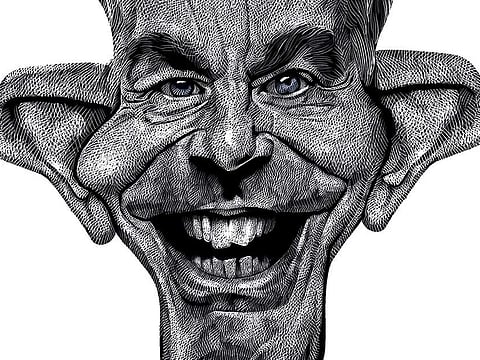Tony Blair: Blast from the past
Former British PM is determined to still play a role in UK politics today. But does anyone care about him anymore?

There’s a Beatles song that asks ‘Will you still need me? Will you still feed me? When I’m sixty-four’. Today, Tony Blair turned 64.
To be honest, we all thought he was long gone from the political stage. Nope. Not a chance. He’s still lingering, even threatening to make a comeback.
Two decades ago this month, Blair swept to power in a landslide victory to become prime minister of Britain. Now his brand of centrist, pro-European politics seems a distant memory in a divided country that has now voted to leave the European Union (EU).
But Blair isn’t going away quietly. In the past week, he has spoken out, trying to bolster the sagging centre ground of British politics, while predicting that voters might think again about the economically damaging hard break with the EU that he believes is looming.
Britons will vote on June 8 in a general election called by Prime Minister Theresa May, a Conservative, who wants a larger parliamentary majority behind her to negotiate the terms of Brexit — Britain’s divorce from the EU. It’s taken her nine months to formally notify Brussels of her nation’s intention to leave the 28-member bloc under Article 50 of the Lisbon Treaty — a step necessary, following last June’s Brexit referendum.
Last year, Blair was roundly criticised by the long-delayed report into the United States-led invasion of Iraq in 2003, and blamed for blindly following and supporting the then US president, George W. Bush, in the illegal occupation in a fruitless and ill-conceived search for weapons of mass destruction. There was a perception then that he was but a poodle for Bush, willing to join the Texan on a gun-slinging cowboy mission to root out some bad guys and guns in Iraq. Their intelligence was faulty — and so was the intelligence offered by spy agencies for those weapons of mass destruction. But instead of opting for a quiet life of well-paid public speaking engagements, Blair is determined to play spoiler role against May — and against a Labour led by Jeremy Corbyn.
And he is warning that May’s leadership will probably lead Britain to a sharp break with the EU — a “hard Brexit”. And he’s suggesting that once the shape of any departure deal becomes clear, Britons may have second thoughts, and should likely have a second referendum. “I personally think that when people see the details, they will hesitate,” he said last week, referring to the complexity of any deal that May can negotiate.
Many would dispute that assertion.
But his skill in winning elections is undisputed. Blair was elected prime minister in May 1997, becoming, at 43, the youngest premier since Lord Liverpool in 1812, ending 18 years of Conservative government and prompting the optimistic “Cool Britannia” era.
For a time then, it looked indeed as if the dawn of the new millennium might herald in a better place. Come the events of 9/11 in 2001, those days were replaced by a War on Terror — and Blair was all too eager to play a role. While traditionalists in his party opposed the rush to war, Blair had hammered out a new centrist path, one that made socialists and trade unionists look like vestiges of the post-Victorian era. There was no doubting his popularity,
later securing two more general election victories and becoming the most-successful Labour leader to follow.
And yes, he was a hard act to follow, but the Conservatives learnt from his slick messaging and campaign style. They are now firmly back in power, and Labour, under Corbyn, is trailing May badly in opinion polls.
Citing polls in Britain suggesting that May will win in June, Blair is urging Britons to vote for candidates who want to keep options open on Brexit, provide an opposition and deny her a “blank cheque”.
The Sun tabloid newspaper in the United Kingdom has even hinted that Blair may be working on forming a centrist party — one that would capture the support of those who voted Remain last June, and those who oppose a hard Brexit favoured by May.
Despite the aftershocks of the financial crisis, Blair believes that centrists can find answers to globalisation. He described Emmanuel Macron, the likely winner of tomorrow’s French presidential election, as a force for change in Europe. The key, Blair says, is “accepting globalisation as a fact, accepting its benefits but preparing people for its consequences,” rather than embracing protectionism or isolationism — as advanced by US President Donald Trump.
The former PM, who was central to ending more than three decades of sectarian violence in Northern Ireland that killed more than 3,600 people, says he will “never give up” on the idea of remaining in the EU, though he conceded that others think this is now impossible.
Though he plans to vote for Labour, Blair has pointedly declined to endorse Corbyn for prime minister, and Blair’s prescription for progressive politics sounds like a veiled criticism of the current Labour leader’s brand of socialism.
“Anything that looks like a form of conservatism of the Left is never going to work, because the progressive forces only win when they understand the future and show how they can make it work for people,” Blair says. “The chief characteristic of the world is accelerating change, and for the Left, it has got to be constantly modernising.”
So today, as he blows out those 64 candles, what wish will be going through his head? Another bite at the cherry? Or just a politically opportune time to try and reshape his legacy one more time?
And don’t forget, there’s another Beatles song, ‘Yesterday’, whose concluding words might be more apt for Blair: ‘I believe in yesterday.’
— With inputs from agencies


